A spotlight on the numbers
Outcomes of complaints closed by HDC in 2023/24
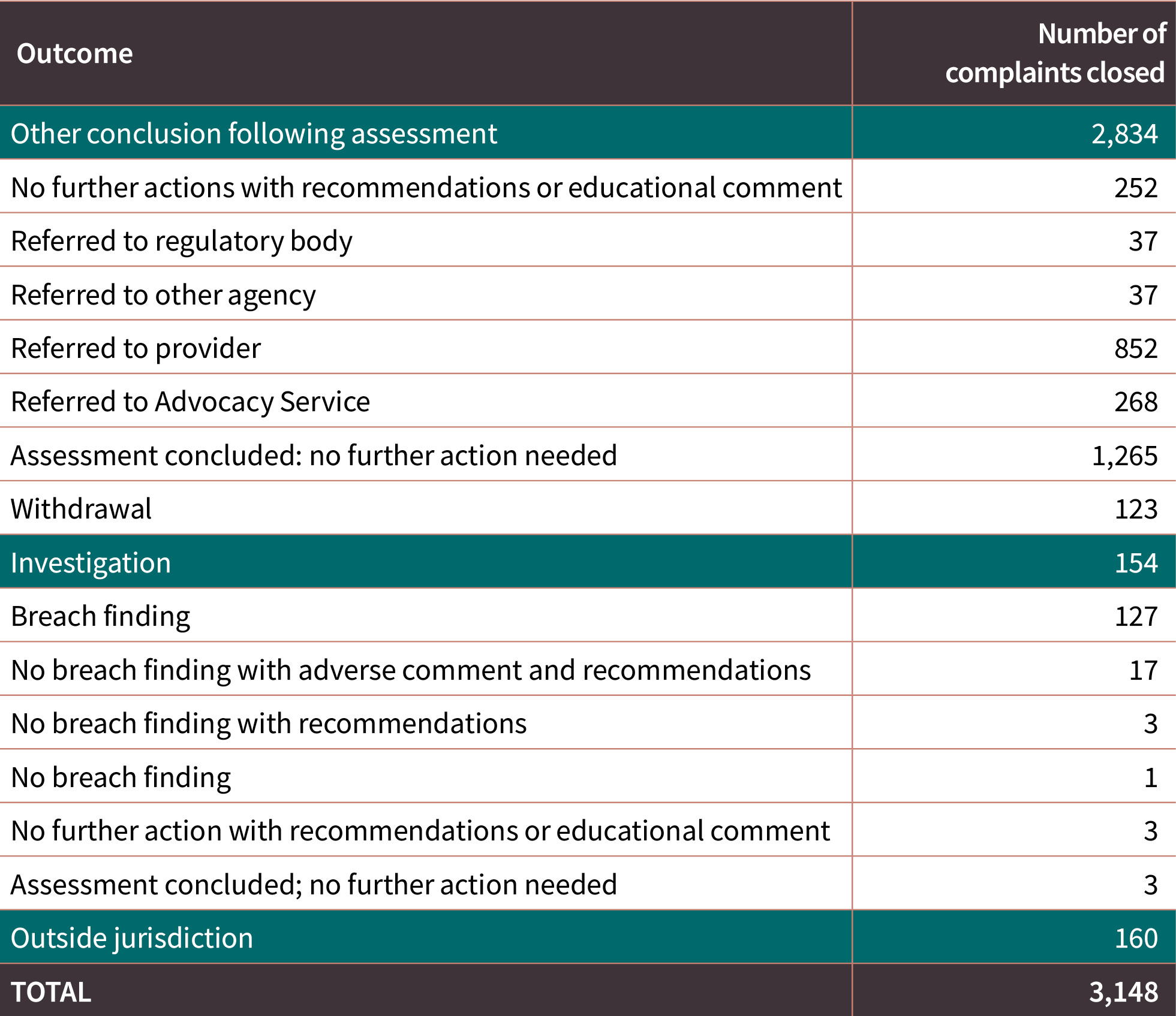
The Health and Disability Commissioner (HDC) plays a crucial role in maintaining the quality and safety of health and disability services. With a unique perspective of the system, HDC draws insights directly from people’s experiences, reflecting on issues such as dignity, respect, informed consent and communication.


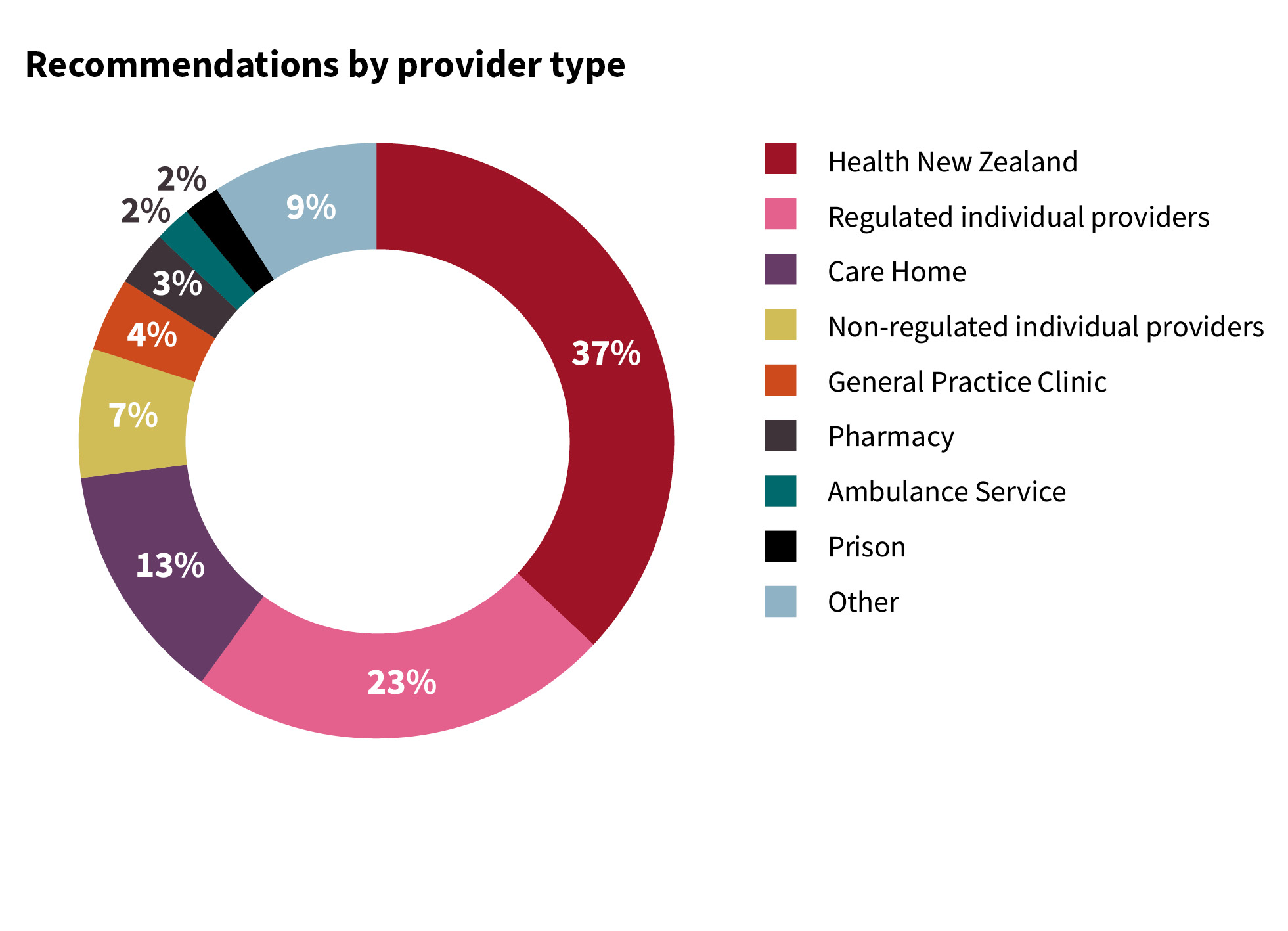
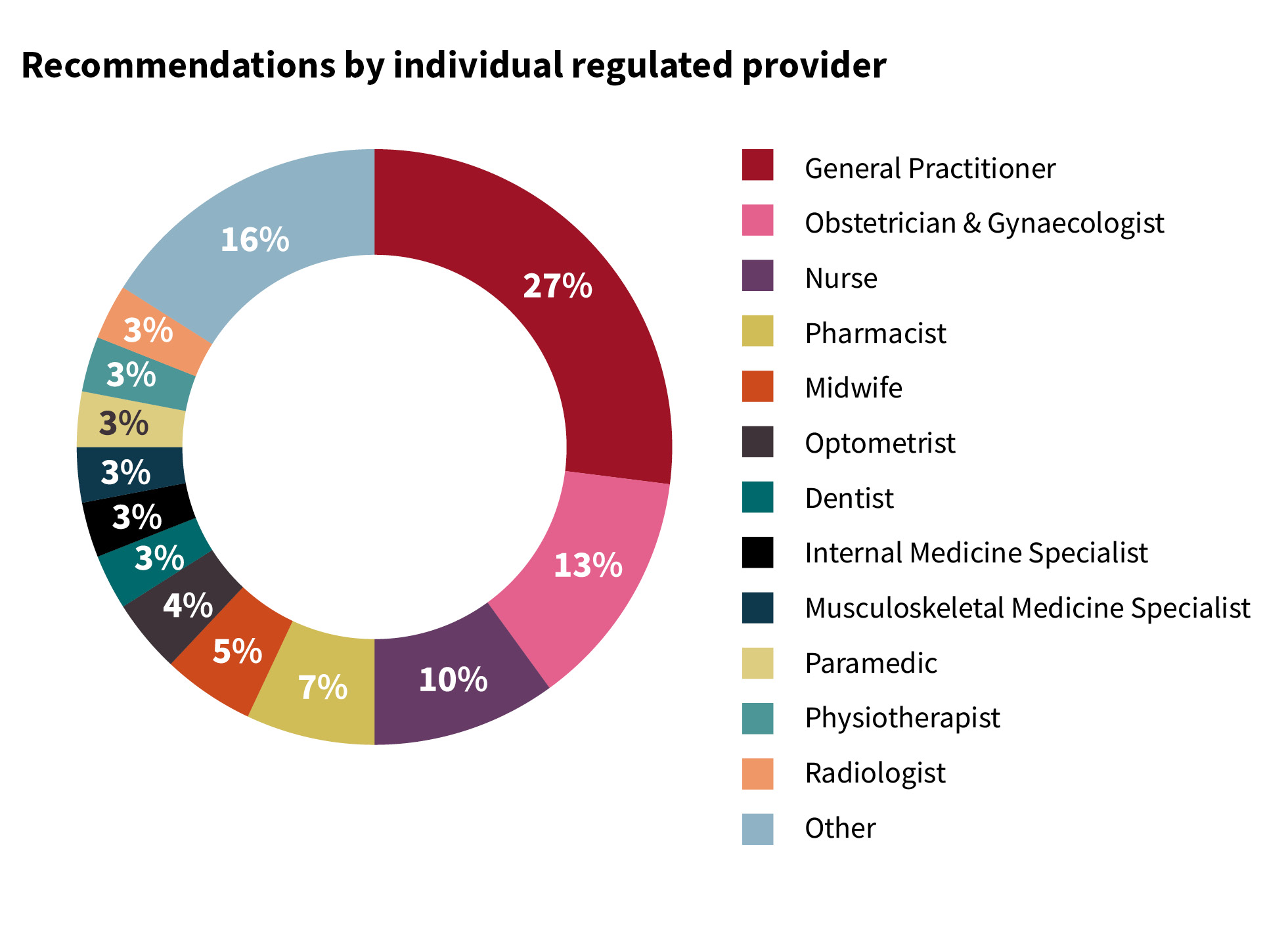
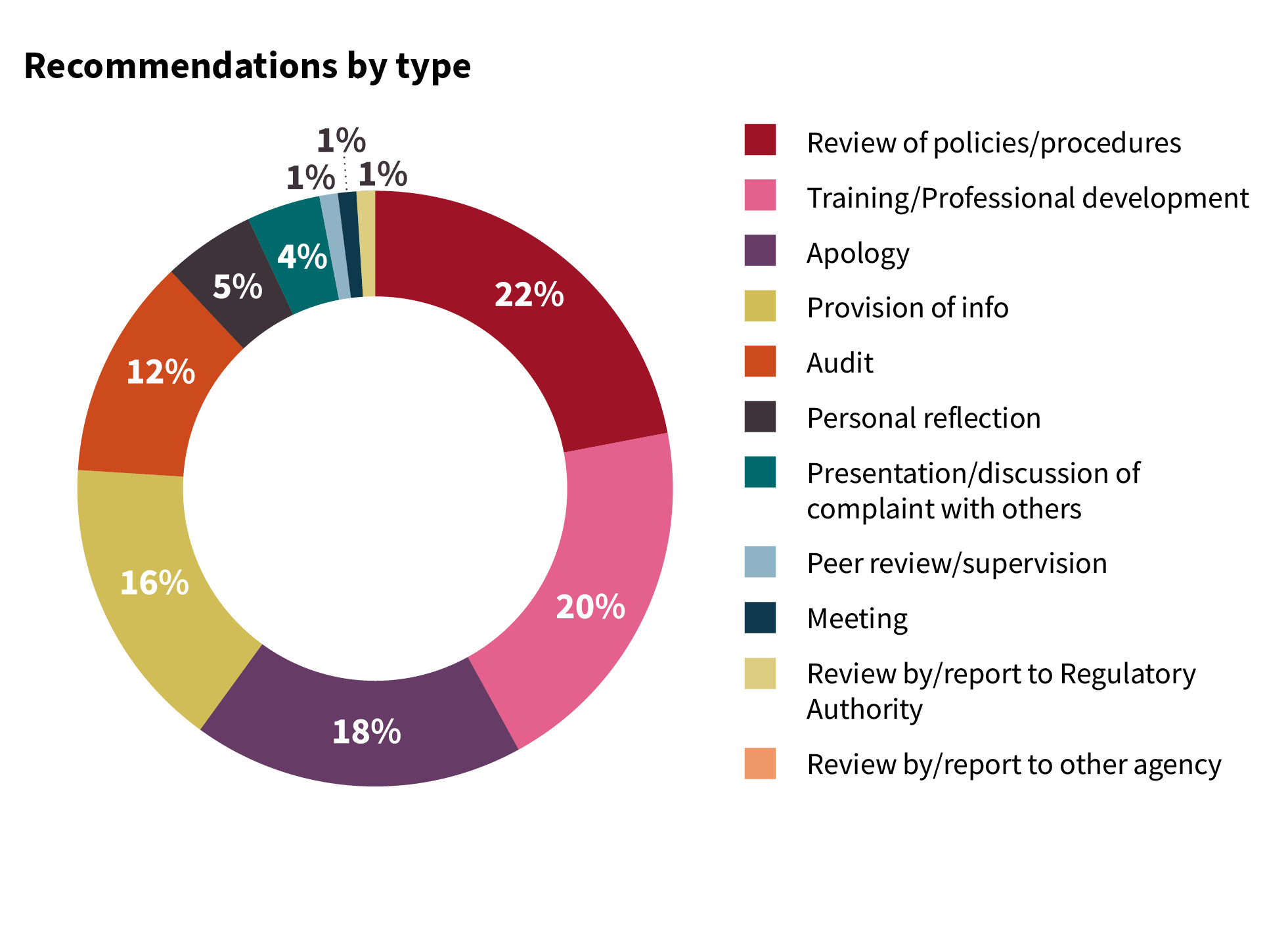
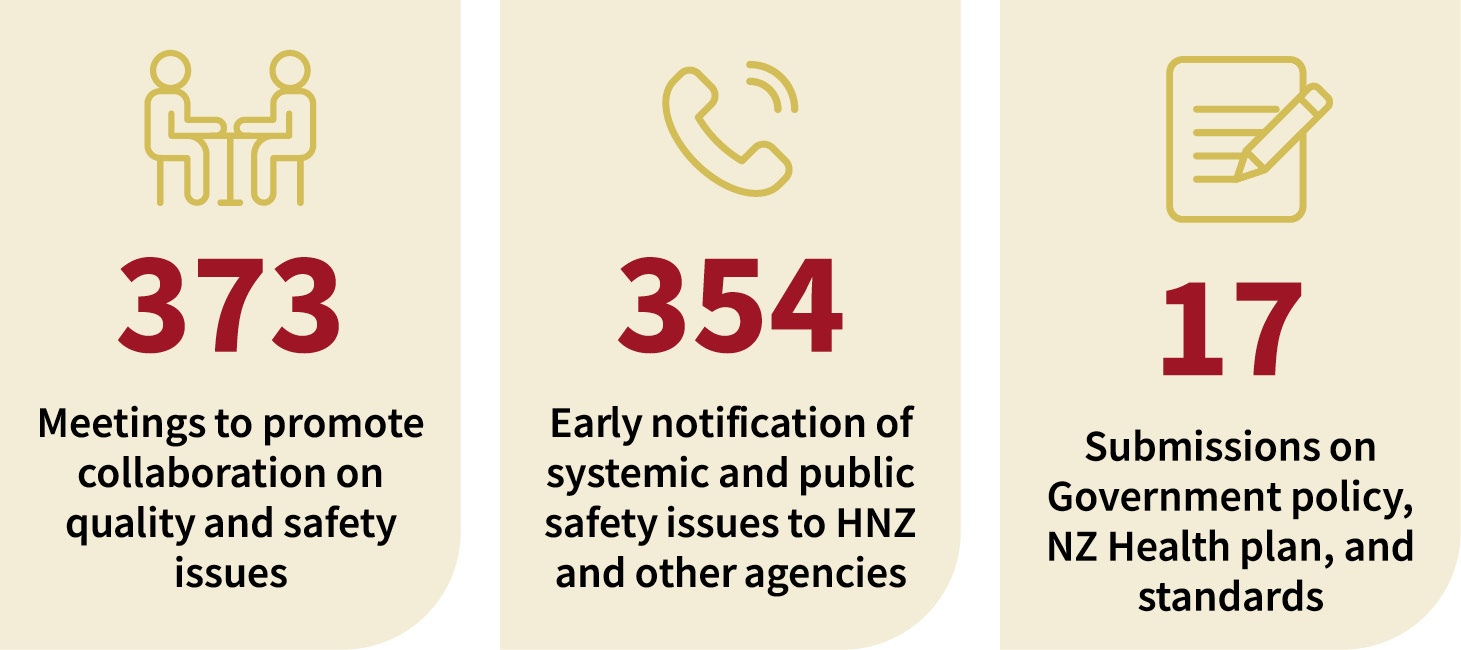
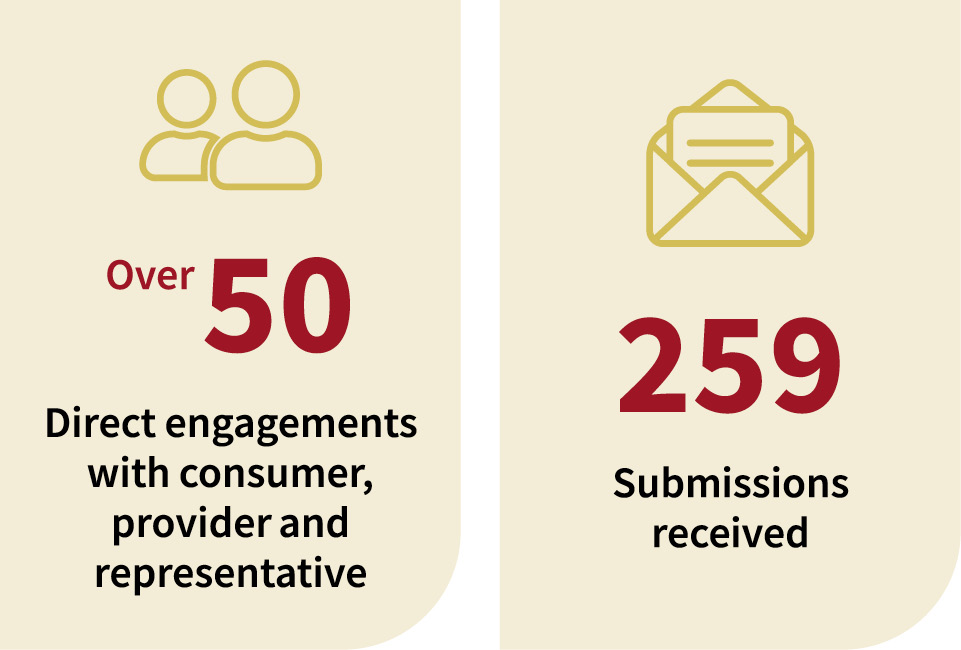

Complaints provide a valuable opportunity to learn and improve services. They allow us to foster stronger relationships between the public and service providers, encouraging a culture of accountability and driving sector-wide improvements.
A brief overview of complaints quantitative data can be found here.
This is an investigation started without receiving a formal complaint from a patient or a consumer. In this inquiry, the Commissioner looks into a potential issue related to the delivery of health or disability services. This may occur when HDC becomes aware of systemic issues, concerns about the practices of a particular provider, or widespread issues affecting consumers’ rights. The inquiry is conducted to determine whether there has been a breach of the Code and to make recommendations for improving the quality of services.
In 2023/24, HDC released an addendum to the Commissioner-initiated inquiry into cancer care delays in the Southern region. It noted that while our recommendations had been met, significant workforce constraints had hindered progress. See the full report here.
HDC frequently makes recommendations to providers designed to improve care quality and safety. Health New Zealand | Te Whatu Ora (Health NZ) received the greatest number of recommendations out of all types of providers, followed by individual providers and care homes.
We monitor the implementation of these recommendations. In cases where recommendations are not followed, HDC may refer providers to their regulatory bodies or publicly name them. However, non-compliance typically stems from legitimate reasons such as retirement or logistical hurdles.
HDC released an addendum to its investigation into cancer care delays in the Southern region, noting that while recommendations were met, workforce shortages slowed progress. HDC recognised that these complex issues require urgent national collaboration and a coordinated plan to tackle nationwide workforce challenges at cancer centres.
After a complaint about a dispensing error, HDC recommended that the pharmacy develop guidelines for prioritising workloads and managing workplace pressures and establish a process for registering, managing, and investigating complaints.
Our investigations frequently result in significant systemic improvements. In 2023/24, we published 107 investigation reports, each offering insights and recommendations to help providers improve their practices. These reports often drive changes to policies, systems, clinical guidelines, and oversight across health and disability services, contributing to improved service quality, safety, and patient experience.
Health NZ was found to have breached the Code due to delays in managing a woman’s serious postoperative complications following a surgical mesh procedure. The Deputy Commissioner also criticised the inadequate information given to the woman about the surgery’s risks and the specialist’s failure to recognise and address her complications promptly.
A residential aged-care provider was found in breach of the Code for failing to provide proper care to an older man in respite care, including inadequate falls management and missed assessments. The Aged Care Commissioner also criticised the lack of a positive culture focused on residents’ wellbeing in care planning and delivery.
HDC collaborates with the sector and other agencies interested in quality and safety to share our findings, amplify the voices of people using services, and monitor the implementation of our recommendations. This ensures that timely action is taken on public safety concerns and, where appropriate, takes a multi-agency approach to areas of shared concern.
We also have strong processes for escalating critical issues to the relevant agencies, ensuring swift intervention when needed for public safety. In most of these cases, HDC will ask the agency to report back on the action taken and will monitor progress.
Our complaint trend reports, including dashboards on public hospital complaints, provide valuable insights into the sector. We also actively participate in the National Quality Forum, using complaint data to influence health strategy, policy, and legislation.
A man complained to HDC about difficulties accessing regular Avastin injections, which he needed to prevent losing his sight. Because his local district did not fund the treatment, he had to move away from his family and home to another district where it was available. Despite efforts to have his home hospital fund the treatment or allow him to travel for care, his requests were denied.
HDC escalated the complaint to Health NZ, pointing out the unfair geographic differences in treatment access. In response, the national office acted quickly, ensuring the man could get care in his home region. The issue of inconsistent access thresholds was addressed at a national level, aiming to standardise care across the country. The man’s complaint was resolved, and no further action was needed.
A woman complained to HDC about losing her spot on a surgery waitlist after being displaced to another region due to a weather event. She was told she needed a new referral from her GP to receive care in the new region, and her home hospital refused to refer her directly.
HDC intervened urgently, asking the providers to work together to ensure the woman could access care. She was waitlisted and received her surgery. HDC also raised the issue with Health NZ, pointing out the poor coordination between districts and the lack of attention to her situation. Health NZ noted efforts to standardise referral processes.
The Māori team within HDC has been building relationships with Māori health teams to help strengthen culturally appropriate support and complaints resolution for Māori whānau. Our Māori team also helps providers coordinate hohou te rongo (peaceful resolution) processes to improve providers’ cultural capability. We are expanding our use of tikanga-led approaches and working with regulatory authorities to support the development and reinforcement of appropriate cultural standards of care.
A Māori woman and her whānau complained to HDC about the care provided by her midwife and a birthing centre after her baby was stillborn. They were also concerned about poor communication and a lack of cultural safety following the stillbirth.
HDC investigated and found that both the midwife and birthing centre had breached the Code for the care provided. The Deputy Commissioner noted that the birthing centre failed to ensure its practices were culturally safe and respected the woman’s mana and beliefs. HDC’s Māori team highlighted that key tikanga practices, such as offering karakia or guidance by a kaumātua, were not provided. The Deputy Commissioner criticised the birthing centre’s inadequate cultural support, which breached Right 1(3) of the Code.
In 2023–24, we conducted a public consultation on the review of the HDC Act and Code, receiving 259 submissions. Throughout this period, we engaged directly with over 50 consumer, provider, and representative groups from across the country. This included online sessions, meetings supported by New Zealand Sign Language, Pacific Talanoa, and sessions focused on the experiences of Asian and migrant communities. We also held hui with Māori in diverse settings and met with individuals and groups with varied experiences of disability. The review was also an opportunity to increase awareness and understanding of the Code, and of the role of HDC and the Advocacy Service.
The consultation centred on proposed changes to the Act and Code, but the feedback will also help us improve how we operate at HDC. Once we’ve reviewed the submissions and feedback, we’ll present a report to Parliament by the end of December 2024. It will then be up to the Minister and the government to decide whether to move forward with the report’s recommendations.
HDC uses submissions to recommend legislative or other actions to better protect the rights of people using health or disability services. Insights from complaints are also used to influence policies and practices across the sector.
A crucial function of HDC is to promote or raise awareness of everyone’s rights when receiving health and disability care. These rights include dignity, informed consent, effective communication, and receiving appropriate standards of care. Health and disability services providers are responsible for informing people of these rights and supporting them to exercise them. By safeguarding these rights, HDC promotes patient- centred care and builds trust in the health and disability system.
To support providers, HDC offers free online learning modules that can be accessed anytime, anywhere — whether at work or home. Launched in November 2022, these modules have now attracted over 15,000 participants (as at October 2024). They provide practical knowledge of the Code, address the complexities of informed consent, and offer guidance on managing concerns and complaints, enabling timelier resolutions.
HDC provides accessible resources for disabled people, their families/whānau, and health and disability services providers. These resources cater to individuals with low vision or blindness, deafness, and those with learning or intellectual disabilities, ensuring that information is accessible to all.
HDC offers a wide range of educational materials, available for free download or at cost for printed versions. These resources are valuable for anyone looking to learn more about their rights and how to use them to navigate the health and disability system.
The Nationwide Health and Disability Advocacy Service (Advocacy Service) is a free service that helps people understand and exercise their rights. Advocates work with people to help resolve their concerns and complaints.
With HDC’s support, the Advocacy Service delivered over 4,000 educational and networking visits, promoting awareness of the Code and guidance on handling complaints.
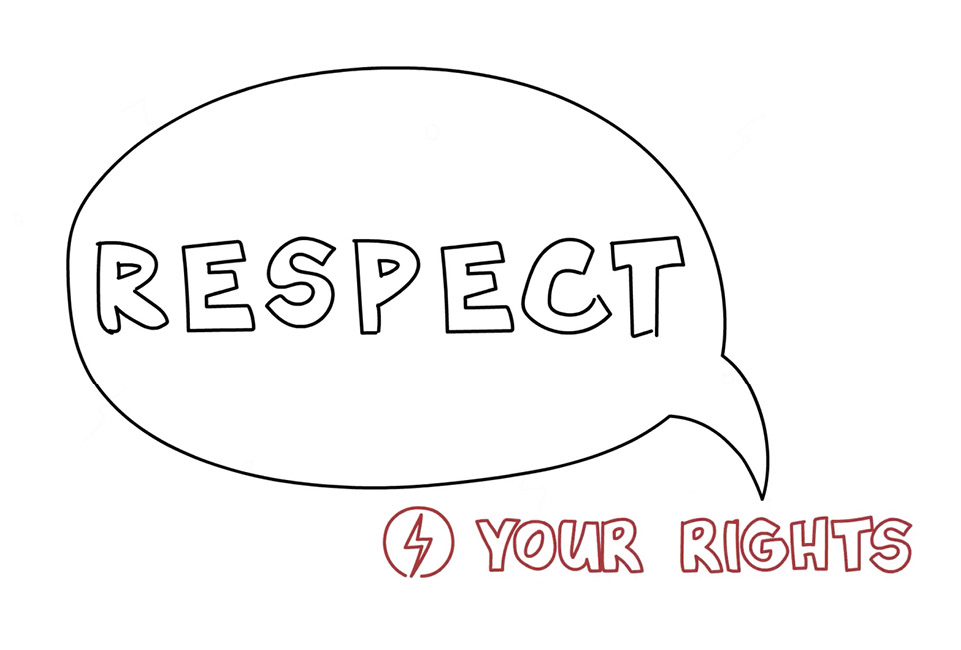
Launched in September 2023, the ‘Respecting Your Rights’ video is available in both Te reo Māori and English, with the option of closed captions. The video empowers people to understand their rights, ask questions, and seek support, ensuring their voices are heard. The English version has already been viewed over 5,000 times (as at October 2024).

This site uses cookies, please review our Privacy Statement.
